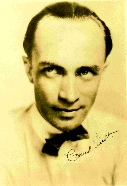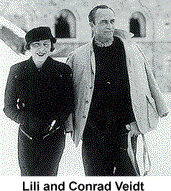
The Conrad Veidt Society
I had felt instantly, in England, that I belonged. I have always felt able
to tell these things in a moment. At a first meeting, at the first sight of a place,
at the first hearing of a voice, I know whether I am in sympathy or antipathetic.
People and places and certain atmospheres give out wavelengths to which, as with
your wireless, you can tune in. As with your wireless, perfect reception depends
on true tuning in. I tuned in truthfully to England. I felt sympathy and understanding
around me. I liked the people I was meeting and working with; I felt curiously
at home. So I decided to stay here for a while, in a place for which I began to
have a real affection, a place through which I had received the best gift an actor
can ever hope to have -
My life flowed in a new rhythm, easy enough and almost completely satisfying. Almost. But I was alone, I had grown to believe that I could never find another human being, who could be everything to me that I had searched for all my life. I grew reconciled to the thought that I should spend the rest of my life alone, with occasional sights of Viola and gratification in my work for solace. I felt that it was my fate, perhaps, to be alone, and since I am always a fatalist, I thought what is to be is to be. And fate, working in its own challenging, mysterious way, introduced a new line into the pattern of my life, the line which was to blend it all into a harmonious whole, to dominate the design and tie up so firmly that they can never be loose again, all the untidy fraying ends.
Two women ran a little club in Berlin where artists and actors and newspaper people congregated. One was called Lili, and she was working hard and meeting many people, to fight the loneliness which was beginning to creep over her life. I went into this club one night to greet some friends, and we met, Lili and I. Lili was the woman I had been seeking all my life. For her I was the man. In Lili I found the miracle of a woman who had all to give that I sought, the perfect crystallisation in one lovely human being, of all my years of searching. Lili had the mother complex too. But in the reverse ratio to mine. In her, the mother instinct was so powerful that she poured it out, indiscriminately almost, on everyone she knew. She mothers her own mother. Meeting Lili was like coming home to an enchanted place one had always dreamed of, but never thought to reach. For her it was the same. Our marriage is not only flawless, it is a complete and logical union, as inevitable as daybreak after night, as harmonious and right as the words that exactly fit the music. My search is finished. The picture in my mind of my mother is of a woman great and holy. But it is a picture clear and. distinct, a deep and humble memory of a woman no one could replace; but now it is not blurred by the complex which before had harassed my mind.
Now, at forty-
 Lili and Conrad Veidt
Lili and Conrad Veidt
A little while ago, while we were making "Jew Suss", something frightened me so that I fled like a drowning man. In the middle of an important shot, my English doctor friend came to the set with the message that Mrs. Veidt had had to be rushed off to the nursing home for an operation. I had left her in the morning well and happy; I thought she was going to die. I nearly went mad with fear and apprehension. We stopped the shot. I left the set, tore off my clothes, took the fast car in an endless journey to the nursing home. As one does, I imagined the worst. The suddenness was such a shock. It was appendicitis; pretty bad, but little danger. She is well and strong again now. But I could not remember suffering so intensely for years. If I had needed any proof of my feeling for Lili, this would have been proof. I needed no proof. I must repeat that our life together is perfect. I ought to touch wood, but instead I follow my star.
So now it is time to disassemble the parts of the jigsaw puzzle or to piece another one together, for I find that, having come to the end of my story, my life is just beginning.
Many thanks to Vivienne Phillips and Sandra J. Bockelman for contributing a copy of the preceding article to the Conrad Veidt Society site.
The photos accompanying this article, are from the book , “Conrad Veidt Lebensbilder”by Wolfgang Jacobsen, published in 1993 by Argon and available from Mail Order Kaiser and www.telebuch.com
The Story of Conrad Veidt
SUNDAY DISPATCH, OCTOBER 1934
(Continued)